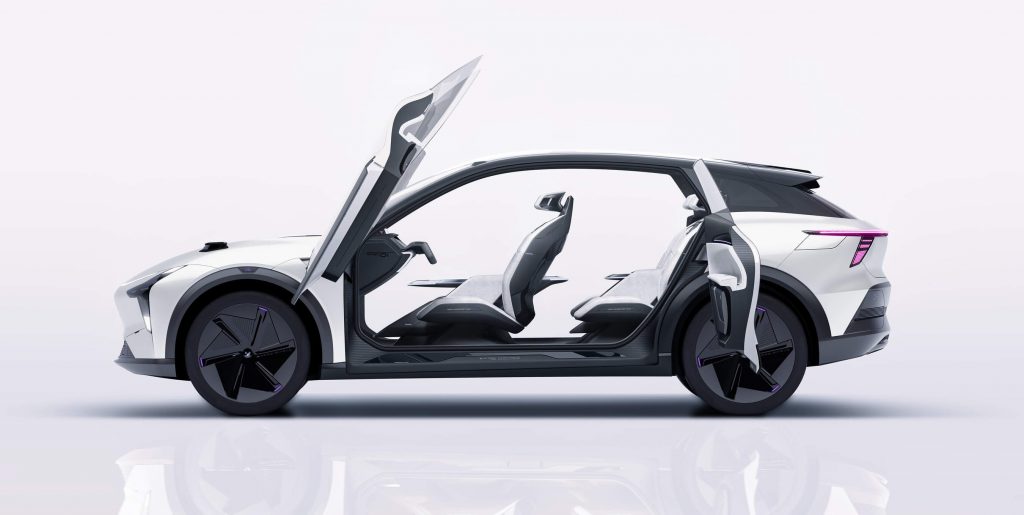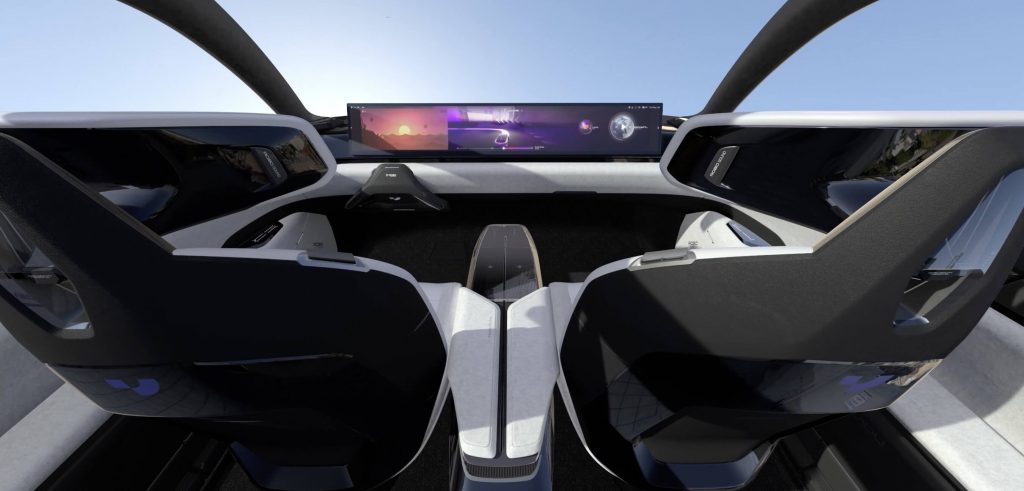- Powered by Baidu’s leading intelligent driving technology, JIDU is set to deliver robocars that fully meet the needs of advanced autonomous driving.
- The concept car, which is 90 percent similar to the production model, features futuristic designs including a U-shaped folding steering wheel, 3D borderless integrated ultra-clear screen, 3D human-machine co-driving map, full-scene voice inside and outside the car, millisecond voice response and offline intelligent voice assistant.
JIDU, an intelligent electric vehicle company backed by Baidu and Geely unveiled its first concept production robocar ROBO-01. Integrating the leading intelligent driving capability powered by Baidu and world-class intelligent driving configurations, joined by a cutting-edge futuristic design, ROBO-01 is set to revolutionize the automobile industry, leading the way to an intelligent car era driven by AI.
Highlights include an active deformable structure design, 3D borderless one-piece large screen, zero-gravity seating, AI pixel lights and dual max-computing chips. The robocar’s capabilities are based on a unique “trainable” functionality and JIDU robocar neural JET (JIDU Evolving Technology), which support a high-level autonomous driving solution with full redundancy, SOA-based intelligent cabin and millisecond-level offline intelligent voice assistant.

Having transitioned from the “Fuel Car 1.0 Era” to the “Electric Car 2.0 Era”, the automotive industry is entering the “Intelligent Car 3.0 Era” with JIDU leading the emergence of a new generation of automotive products.
“The Intelligent Car 3.0 Era is the era of robocars,” said Xia Yiping, CEO of JIDU. “The transition to this new era is marked by the shift of driving power from humans to AI, with robocars ultimately achieving self-generating progress led by AI. The automotive industry in the 3.0 era will see a seismic shift from a revolution in energy to a revolution in product attributes. The ultimate goal is to realize a fully driverless transportation experience. The JIDU robocar aims to meet users’ needs for intelligent travel, in-car intelligent assistance and intelligent cabin in the new era.”
The robocar was unveiled at JIDU’s first-ever branded event ROBODAY, held in XiRang metaverse. At the unveiling, the first-ever digital human car owner, named Xijiajia, drove and interacted with ROBO-01.
Futuristic – 3D borderless integrated ultra-clear large screen, free of door handles, indicator levers and other physical control keys
ROBO-01 features a simple and futuristic look. The design of the main and passenger butterfly wing doors, rear pair of doors and non-marking side windows is also one-of-its-kind in the industry, complimenting a sleek and dynamic robot-like car body.

The 3D borderless ultra-clear screen is a truly integrated, non-spliced screen, designed to run throughout the driving seat to the main passenger seat, providing an immersive audio and visual experience. In addition, the door handle, shift lever, left and right indicator levers and other physical control keys are removed, making the human-vehicle interaction experience even more natural and seamless.
Robotic – Stronger AI perception, more active adjustable structures
ROBO-01 comes with stronger AI perception and more active service capabilities. It is equipped with a set of fully adjustable structures, including front hood collapsible LiDAR, active liftable rear wing ROBOWing, foldable U-shaped steering wheel, liftable satellite speakers and adaptive zero-gravity seat.
The collapsible LiDAR designed by JIDU enhances the safety and stability of the intelligent driving system while strengthening the sensing capability of advanced autonomous driving. The LiDAR can be collapsed by AI intervention before a crash occurs, thus improving safety. Recently, JIDU has obtained the Chinese national patent for this technology.
The unique U-shaped steering wheel design of ROBO-01 can maximize the information visibility on the large ultra-clear screen. In addition, the leading steering-by-wire technology of JIDU can support the U-shaped steering wheel to be folded and hidden as needed, as well as enhance the variable steering ratio of the vehicle in automatic driving mode.
The spacecraft-inspired zero-gravity seats are lightweight and breathable, wrapping around the occupant, including a unique “swan neck” headrest design with an adaptive adjustment function, making every trip effortlessly comfortable.
Emotional – interactive AI light language, unlimited emotional communication
ROBO-01 has the ability to recognize the user’s emotions and interact with the outside world by expressing its own emotion. Its robotized front design integrates interactive AI pixel headlights and high recognition rate AI voice interaction system, enabling voice recognition function outside the car for natural communication between humans, the vehicle and the environment.
JIDU Smart Drive: Advanced autonomous driving capabilities for immediate deployment in multiple scenarios
JIDU is the only smart automaker in the industry that applies the full-stack Apollo autonomous driving unmanned capability and safety system. Baidu Apollo’s advanced autonomous driving capabilities have been extensively applied in its Robotaxi, with 27 million kilometers of safe autonomous driving test mileage and a large Robotaxi road test fleet conducting real road tests in more than 30 cities across China, continuously improving the autonomous driving system’s ability to cope with complex urban roads.
The system is equipped with Nvidia’s “dual” Orin X chips and 31 external sensors, including 2 LiDAR, 5 millimeter-level wave radar, 12 ultrasonic radar and 12 cameras. Based on JIDU’s self-developed SOA cabin-driving fusion technology architecture, the industry-leading “true redundancy” solution for advanced autonomous driving is created by its technological innovation of dual systems for redundancy. The solution has been successfully tested and run on the JIDU SIMUCar (software integrated simulation vehicle), which has verified the safety and stability of JIDU’s advanced autonomous driving system for mass production.
Capable of point-to-point advanced autonomous driving, JIDU’s system is able to adapt to three main driving scenarios: high-speed, urban roads, and parking. The system has tested and verified ability to handle unprotected left turn, traffic light recognition, obstacle avoidance and freeway on/off ramps. Users will be able to access these and other advanced autonomous driving functions from the moment they begin driving, providing unprecedented convenience and versatility.
Millisecond-level rapid response and offline intelligent voice assistant provides human-like interaction
The intelligent cabin is equipped with advanced functions such as offline voice assistant, millisecond-level response, 3D human-machine co-driving map and full-scene interaction inside and outside the car.
JIDU is also the first to launch the 4th generation Snapdragon Automotive Cockpit Platform – 8295 chip, which has enabled the 3D presentation of the boundless integrated ultra-clear large screen, meeting users’ needs of driving navigation, game entertainment, online office and other scenarios.
The millisecond-level intelligent voice response of the JIDU intelligent cabin realizes 100% coverage of all scenarios inside and outside the car, while the full offline intelligent voice function is free from reliance on network signals. In addition, its multi-modal “human-like” interaction capabilities, such as visual perception, voice recognition and lip capture, allow for “natural and smooth” communication between user and car.
In the era of Intelligent Car 3.0 and AI-driven evolution, JIDU’s robocar is on track to explore new frontiers. JIDU plans to officially launch a limited version of its first production model in the coming fall, which will be 90% similar to the ROBO-01 concept car. In addition, JIDU will also unveil the design of its second production model at this year’s Guangzhou Auto Show.
